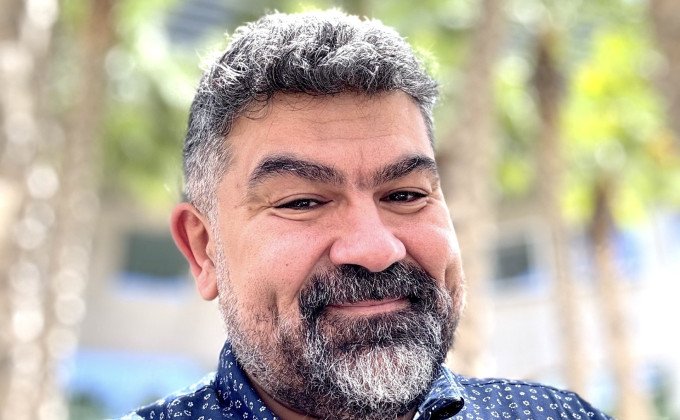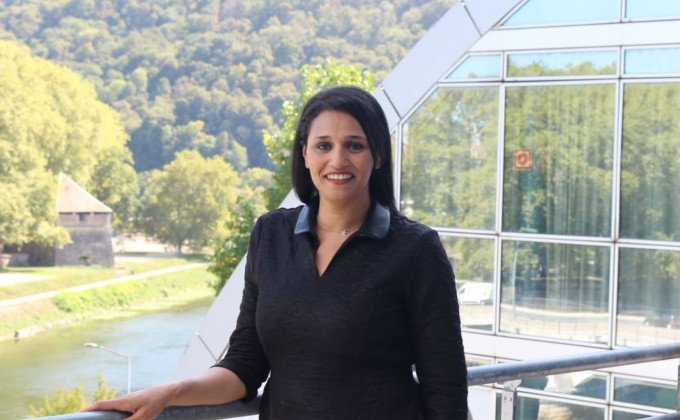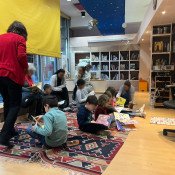
الذكاء الاصطناعي: مساعد لا مستبدل
مقابلة مع ميمي ميلكونيان
مقابلة مع ميمي ميلكونيان، خبيرة في تعليم الّلغة العربية. ستشارك ميمي ميلكونيان في المدرسة الخريفيّة لتعليم اللّغة العربيّة الّتي ينظّمها مركز اللّغة والحضارة العربية لمعهد العالم العربي بين 21 و25 أكتوبر 2024.
(English version below)
(Version française plus bas)
ميمي ملكونيان قائدة بارزة في مجال تعليم اللغات، وتشغل منصب رئيسة مجلس معلمي اللغة العربية في نيويورك. كما هي معلمة لغات في مدرسة برونسويك في غرينتش، متخصصة في تعليم اللغة العربية والفرنسية. مع سجل حافل من الإنجازات، حصلت ميمي على العديد من الجوائز، بما في ذلك جائزة سفيرة النوايا الحسنة من وزير الخارجية وحاكم أركنساس، وكذلك شهادة زمالة من معهد الرياضيات وتطبيقاتها في لندن. حصلت ميمي على جائزة المعلمين من متحف تكريم أحداث 11 سبتمبر في نيويورك. بالإضافة إلى إنجازاتها المهنية هي أيضًا مؤلفة، حيث نشرت كتابها الأول في عام 2018 بعنوان "طيور الليل: قصص حقيقية عن الهروب، والأمل، والصمود".
هذه التقنية لا تسرع فقط اكتساب الكفاءة، بل تدعم المعلمين أيضًا بتحليلات متقدمة، تساعدهم على تطوير طرقهم بنسبة أكبر من الفعالية. لذا، أقول بثقة أن الذكاء الاصطناعي يسهم بشكل كبير في تطوير تعليم اللغة العربية.
ما هي منافع هذا اللقاء الذي ينتوي معهد العالم العربي أن يقيمه في باريس خلال الخريف والذي يجمع خبراء اللغة العربية من مختلف أنحاء العالم؟
فوائد الاجتماع هو، كما ذُكر في السؤال، جمع خبراء اللغة العربية من مختلف أنحاء العالم. هذا الاجتماع يساهم من دون أي شك في التطوير المهني، فيعزز المعلمون مهاراتهم التعليمية من خلال ورش العمل والعروض التقديمية والنقاشات التي يقودها الخبراء. يمثل الاجتماع أيضًا فرصة للتواصل، فلدى المشاركين فرصة للتواصل مع أقرانهم والمحترفين من خلفيات متنوعة مما يعزز التعاون ويشجع على مشاركة الممارسات التعليمية المبتكرة. النظرة العالمية والتبادل الثقافي أيضًا منتجين من اللقاء: يكتسب المشاركون رؤى حول الاتجاهات الدولية والمنهجيات والأبحاث في تعليم اللغة العربية، مما يثري ممارساتهم التعليمية الخاصة ويعزز التفاهم والتقدير بين المشاركين. أخيرًا وليس آخرًا، يمكن للمشاركين الوصول إلى مجموعة واسعة من الموارد ومشاركتها، بما في ذلك المواد التعليمية والنتائج البحثية وأدوات التدريس، التي يمكن دمجها في بيئاتهم التعليمية.
تودين أن تتحدثي في مداخلتك عن الذكاء الاصطناعي في تعلم اللغة العربية وتعليمها. هل من الممكن أن تحدّثينا باختصار عن هذا المفهوم وأهميته؟
يعزز الذكاء الاصطناعي في مجال اللغة العربية التجارب التعليمية من خلال توفير مسارات تعلم مخصصة وتقديم تغذية راجعة فورية وتمارين تفاعلية. الأدوات المدعومة بالذكاء الاصطناعي مثل تطبيقات معالجة اللغة والمدرسين الافتراضيين يمكنها التكيف مع احتياجات المتعلمين الفردية، مما يجعل التعليم أكثر كفاءة وجاذبية. هذه التقنية لا تسرع فقط اكتساب الكفاءة، بل تدعم المعلمين أيضًا بتحليلات متقدمة، تساعدهم على تطوير طرقهم بنسبة أكبر من الفعالية. لذا، أقول بثقة أن الذكاء الاصطناعي يسهم بشكل كبير في تطوير تعليم اللغة العربية.
هل تظنين أن طرق تعليم اللغة العربية تواكب التطور بسرعة أم ببطء؟
يعتمد ذلك على المكان والبلد الذي تُعلَّم فيه اللغة العربية. في بعض المناطق، لا سيما تلك التي تتمتع بتكنولوجيا تعليمية متقدمة وموارد كافية، تتطور الأساليب بسرعة من خلال دمج الأدوات الرقمية والممارسات التعليمية المبتكرة غير أن في مناطق أخرى، قد يكون التقدم أبطأ بسبب قلة الموارد واتباع المنهجيات التقليدية ونقص الوصول إلى الأدوات التعليمية الحديثة.
يبدو أن هناك عدم اتفاق على مبدأ استخدام الذكاء الاصطناعي بين مختلف الخبراء في تعليم اللغة العربية. ما هو التوازن الذي علينا أن نعتمده في التعليم وهل توافقين البعض بأن استخدام الذكاء الاصطناعي يحدد من حرية وعمل المعلم؟
على المعلمين في كل مؤسسة الالتزام بقواعد تلك الأخيرة وتوجيهاتها. للتواصل بفعالية مع متعلمي اللغة العربية من جيل الألفا، ينبغي على المعلمين أن يتعرفوا على التعلم الآلي. الجيل الألفا القادم متمرس في التكنولوجيا، ويدمج الذكاء الاصطناعي في حياته اليومية. يجب على المربين أن يشاركوهم بنشاط من خلال دمج الذكاء الاصطناعي لإثراء تجاربهم التعليمية. كما أشار الأستاذ في كلية هارفارد للأعمال كريم لخاني: "الذكاء الاصطناعي لن يحل محل البشر، بل البشر مع الذكاء الاصطناعي سيحلون محل البشر بدونه."
فلنتبنى الذكاء الاصطناعي في تعليم وتعلم اللغة العربية بمنهج مستقبلي!
AI in teaching Arabic: friend or foe?
Mimi Melkonian currently serves as president of the New York Arabic Teachers' Council. Her contributions have been invaluable in advancing the field and fostering cultural understanding through language education. Mimi is also a language educator at Brunswick School, Greenwich, specializing in Arabic and French teaching. Mimi has received multiple awards, including the esteemed Goodwill Ambassador Award from the Secretary of State and Governor of Arkansas, as well as a Licentiate of The Institute of Mathematics and its Applications in London. Mimi's teaching skills have been recognized with the Teachers Award from the 9/11 Tribute Museum in New York City. In addition to her professional achievements, she is also an author, having published her debut book in 2018, titled "Nightingales: True Stories of Escape, Hope, and Resilience."
This technology not only accelerates proficiency but also supports teachers with advanced analytics, helping them tailor their instruction more effectively. Thus, AI significantly contributes to the evolution of Arabic language education.
The Arab World Institute (IMA) intends to organize an Autumn School in Paris, which brings together Arabic language experts from various parts of the world. What are, in your opinion, the benefits of such meetings?
The first benefit of such meetings is already mentioned in the question itself; bringing together specialists from all over the world who share the same vision. In addition to that, we can start listing: professional development. Teachers can enhance their teaching and learning skills through workshops, presentations, and conferences led by renowned experts. It also evidently creates networking opportunities. Participants have the chance to network with peers and professionals from diverse backgrounds, fostering collaborations and sharing innovative teaching practices. It undoubtedly also gives the participants global perspectives by interacting with experts from different countries. Attendees gain insights into international trends, methodologies, and research in Arabic language teaching, enriching their own educational practices just as cultural exchange is encouraged by bringing together educators who share a passion for Arabic language and culture, promoting a deeper understanding and appreciation among participants. Last but not least, one of the most important benefits would be resource sharing: attendees can access a wide range of resources, including educational materials, research findings, and teaching tools, which they can integrate into their own teaching environments.
During your intervention, you will be tackling a very recent and controversial topic: the use of AI in teaching and learning Arabic. Can you tell us briefly about this concept and its importance?
AI enhances educational experiences in Arabic learning and teaching by providing personalized learning paths, instant feedback, and interactive exercises. AI-driven tools like language processing apps and virtual tutors can adapt to individual learners' needs, making education more efficient and engaging. This technology not only accelerates proficiency but also supports teachers with advanced analytics, helping them tailor their instruction more effectively. Thus, AI significantly contributes to the evolution of Arabic language education.
Do you think Arabic language teaching methods are keeping up with technological advances?
A general or categorical answer cannot be given in this case… It depends on where and in which country Arabic is being taught. In some regions, particularly those with advanced educational technologies and resources, methods are evolving quickly with the integration of digital tools and innovative teaching practices. However, in other areas, progress may be slower due to limited resources, traditional methodologies, and lack of access to modern educational tools.
There seems to be some disagreement among various experts on the principle of using AI in Arabic teaching. Is there a balance we must adopt in education? Do you agree that the use of AI limits a teacher's freedom and work?
In every institution, instructors must adhere to said institution’s rules and guidelines. To effectively connect with Gen Alpha language learners, teachers should familiarize themselves with AI. The upcoming Alpha Generation is tech-savvy, integrating AI into their daily lives. Educators must actively engage them by incorporating AI to enrich their learning experiences. As Harvard Business School Professor Karim Lakhani stated, "AI is not going to replace humans, but humans with AI will replace humans without AI."
Let us then embrace AI in teaching and learning Arabic language for a forward-looking approach!
Intégrer l’IA dans l’enseignement de la langue arabe
Entretien avec Mimi Melkonian, experte en l’enseignement de la langue arabe. Mimi sera l'une des conférencières de l’Ecole d’automne du Centre de langue de l’IMA dédiée à la didactique de la langue arabe qui se tiendra du 21 au 25 octobre 2024.
Mimi Melkonian est une figure éminente de l'éducation linguistique et la présidente du Conseil des enseignants d'arabe de New York. Elle a reçu de multiples prix, dont le prestigieux prix d'Ambassadeur de bonne volonté décerné par le secrétaire d'État et le gouverneur de l'Arkansas, un diplôme de l'Institut de mathématiques et de ses applications à Londres et, en reconnaissance de ses compétences dans le domaine de l'enseignement, le Prix des enseignants du musée du 11-Septembre à New York. Elle enseigne actuellement l'arabe et le français à la Brunswick School de Greenwich, et a par ailleurs publié Nightingales: True Stories of Escape, Hope, and Resilience (2018, non traduit).
L'intelligence artificielle, non seulement contribue à accélérer la maîtrise de la langue, mais guide également les enseignants en leur fournissant des analyses avancées, qui les aident à adapter leur enseignement aux besoins des apprenants de manière plus efficace.
L’Institut du monde arabe (IMA) organise à Paris son École d’automne, qui rassemble des experts internationaux de la langue arabe. Que peuvent apporter, selon vous, de telles rencontres ?
Concernant le premier bénéfice, la réponse est comprise dans la question : réunir des spécialistes du monde entier qui partagent une même vision. Je pourrais bien sûr en citer bien d'autres, dont le développement professionnel. Les enseignants peuvent améliorer leurs compétences grâce à des ateliers, des présentations et des conférences animées par des experts de renom. C'est aussi une précieuse opportunité pour tisser des réseaux entre professionnels, avec des pairs de divers horizons, favoriser les collaborations, les partenariats et partager des pratiques d’enseignement novatrices.
Cette rencontre ouvre sans aucun doute aux participants des perspectives mondiales en interagissant avec des experts de différents pays. Ils y acquièrent un aperçu des tendances internationales, des méthodologies et de la recherche dans l’enseignement de la langue arabe, enrichissant leurs propres pratiques éducatives. Les échanges culturels eux aussi augmentent de par la réunion des éducateurs qui partagent une passion pour la langue et la culture arabes.
Enfin, l’un des avantages les plus importants serait le partage de ressources : les participants peuvent accéder à un large éventail de ressources, y compris à du matériel éducatif, des résultats de recherche et des outils pédagogiques qu’ils peuvent intégrer dans leurs propres méthodes d’enseignement.
Dans votre intervention, vous aborderez un sujet récent et controversé : l’utilisation de l’IA dans l’enseignement et l’apprentissage de l’arabe. Pouvez-vous en dire un peu plus sur ce qu'elle apporte ?
L'intelligence artificielle (IA) dans l'apprentissage et l'enseignement de la langue arabe améliore les expériences éducatives en offrant des parcours d'apprentissage personnalisés, des retours instantanés et des exercices interactifs. Les outils alimentés par l'IA, tels que les applications de traitement du langage et les tuteurs virtuels, peuvent s'adapter aux besoins individuels des apprenants, rendant l'éducation plus efficace et attrayante. Cette technologie, non seulement contribue à accélérer la maîtrise de la langue, mais guide également les enseignants en leur fournissant des analyses avancées, qui les aident à adapter leur enseignement aux besoins des apprenants de manière plus efficace. Nous pouvons donc dire que l'IA contribue de manière significative à l'évolution de l'enseignement de la langue arabe.
Les méthodes d’enseignement de la langue arabe suivent-elles les progrès technologiques ?
Je ne peux pas vous faire une réponse générale ou catégorique… Tout dépend de l'endroit et du pays où la langue arabe est enseignée. Dans certaines régions, notamment celles disposant de technologies éducatives avancées et de ressources suffisantes, les méthodes évoluent rapidement grâce à l'intégration d'outils numériques et de pratiques pédagogiques innovantes. Dans d'autres régions, les progrès peuvent être plus lents en raison de ressources limitées, de méthodologies traditionnelles et d'un manque d'accès aux outils éducatifs modernes.
Il semble qu'il règne un certain désaccord entre experts sur le principe de l’utilisation de l’IA dans l’enseignement de la langue arabe. Y a-t-il un équilibre à adopter ? Êtes-vous d’accord avec l'idée selon laquelle l’utilisation de l’IA limite la liberté et le travail des enseignants ?
Les enseignants doivent respecter les règles et directives de l'institution au sein de laquelle ils exercent. Cependant, pour obtenir de meilleurs résultats avec les apprenants de la génération alpha, ils devraient apprendre à utiliser l'intelligence artificielle. Cette génération est extrêmement technophile, et exposée à la technologie dès son plus jeune âge, intégrant l'IA dans son quotidien. Les éducateurs doivent donc pouvoir intégrer l'IA afin d’enrichir leurs expériences d'apprentissage. Comme l'a souligné Karim Lakhani, professeur à Harvard Business School : « L'IA ne remplacera pas les humains, mais les humains avec IA remplaceront les humains sans IA ! »
Adoptons l'IA dans l'enseignement et l'apprentissage de la langue arabe pour une approche tournée vers l'avenir !










